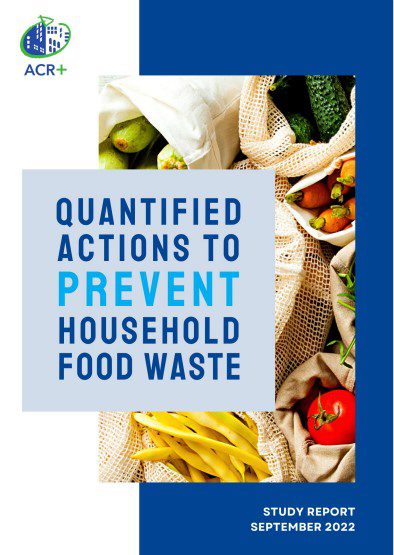Photo by Markus Spiske on Unsplash
Food waste represents very significant economic losses and is the cause of about 8% of the global greenhouse gases emissions. Households are a major contributor of food waste, caused by e.g. over-purchase, wrong interpretation of the “best before” and “use by” labelling systems, inefficient storage methods, faulty food consumption habits and poor food leftovers management. Not only a large part of the generated food waste is avoidable, but reducing food waste generation would have a considerable impact in terms of curbing carbon emissions. Food waste prevention is of great importance, especially in view of the upcoming food waste reduction targets that the EC aims to set by 2023. However, little evidence is currently available on how to significantly reduce household food waste from a practical point of view and food waste still remains a challenge for many cities and regions in Europe.
With its new report, ACR+ is grabbing this issue and provides local authorities with selected practices and strategies for which food waste reduction was monitored and documented.
The report “Quantified actions to prevent household food waste” presents 4 key recommendations and 20 associated actions that public authorities can take to tackle household food waste on their territories and promote practices to successfully reduce it. These are:
- Promote self-assessment of individual food waste generation
- Inform, raise awareness, promote preventive actions
- Collaborate to improve the information on food products
- Determine your resources, objectives, and monitoring
For this report, ACR+ identified 13 strategies and practices in 7 countries with quantified results to reduce household food waste. The network analysed 4 national or regional strategies, 4 operations focusing on food waste measurement, 2 communication campaigns, 2 actions addressing food labelling, 1 action in cooperation with small business. The report presents good practices focusing on household food waste prevention for which quantitative data are available regarding avoided quantities. It also lists the main messages and key recommendations identified in the literature, in local, regional, and national food waste prevention strategies, and in past and on-going European projects and initiatives.
Food waste prevention is a key priority for bioeconomy strategies; regardless of the environmental benefits associated with food waste recycling, it cannot compensate the emissions of food production, distribution, and consumption if edible food is waste. This is why the Metropolitan Area of Barcelona, one of the Biocircularcities pilot territories, will investigate potential for food waste prevention in parallel to its improved biowaste collection.
Do you want to find some inspiration to enhance your local food waste prevention strategy?
Download the report “Quantified actions to prevent household food waste” and its executive summary to find out more about successful practices on household food waste reduction!
17 October 2022
